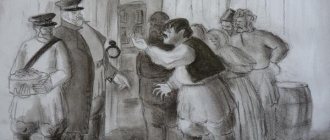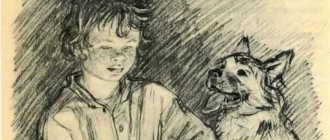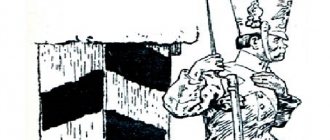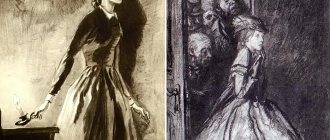- Essays
- On literature
- Characteristics and image of Lefty
/
/
The left-hander from Leskov’s story is a Tula master. He was one of three craftsmen who had the honor of showing their skill and superiority over foreigners. This was the order of the emperor, who believed in his people.
After completing the work, Lefty, by coincidence, ends up in the imperial palace, and then abroad, where his skill was appreciated. Even the British tried to lure him to their side, as they saw great talent in him. However, the hero refused and, after staying with them for some time, went home.
Lefty's appearance is described very sparingly in the work. Only his squint, the presence of a birthmark on his face, and the fact that the hair on his temples had been torn out were noted. The hero doesn't even have a name. They simply call him Lefty because he did everything with his left hand.
Lefty is a person from the common people. His clothes are poor and rather shabby. This is quite a common occurrence for people of his class at that time.
By character, the master is quite bold and straightforward. However, his courage borders on hopelessness. So, when Platov grabbed him and took him to the emperor, he simply had no choice. But, Lefty is firmly confident that he will be able to answer to him and other masters will not be let down.
He was bold in conversation. Expressed simply. He is also not lacking in resourcefulness. He is not afraid to speak with the emperor and explain himself to the British, not knowing their language.
Lefty is loyal to his home country. The foreigners could not bribe him with anything. It may be true that this has more to do with the fact that he simply could not imagine any other life for himself other than the one to which he was accustomed.
During Lefty's stay in England, possible further conditions for his residence and work were presented to him. They promised to teach him to read and write and marry him. Lefty saw the conditions under which English craftsmen work. They were far better than at home.
But all this was unusual for him. The author points out that his hero will not get involved with what he does not know, but only sees, even when he was choosing his food. Lefty did not eat or drink what he saw for the first time.
Despite his enormous creative potential and resourcefulness, he still remains a downtrodden person, of which there were many at that time. He was a man accustomed to rough treatment and who knew his place. The left-hander in Leskov’s story is a collective image. It unites all folk craftsmen who are good at their craft and have amazing talent, but do not have the opportunity to fully realize themselves. It was not for nothing that Plato told the emperor that Russian masters were no worse than foreigners, it was only necessary to improve the conditions for them.
But what the Tula craftsmen did turned out to be necessary only to prove national superiority. One might even say that most of all - to console the imperial pride. Nothing has changed after their work, their living and working conditions have not improved. And Lefty, upon his return, dies in a hospital for the homeless, where, thanks to a neglectful attitude, he simply breaks his head on the parapet. He was no longer needed, and no one cared about him. Even Platov, who was approached by Lefty’s English comrade, did not want to help him.
Characteristics of Lefty
Gunsmith Lefty is the main character of N. Leskov’s story. An interesting tale, which has become the plot of animated and feature films, and theatrical productions, conveys the essence of the life of Russian talent. The image and characterization of Lefty in the story “Lefty” help to understand the events of the history of Rus', to understand how and how a simple Tula gunsmith lived.
Lefty's Appearance
The master gunsmith Lefty remained known to everyone only by his nickname. Nobody knows his real name. The nickname was given for his skillful use of his left hand. It’s even more convenient for a master to cross himself with his left hand. This ability surprised the British. Overseas engineers did not even imagine that one could become a skilled craftsman without using the right hand. Left-handed people suffer from strabismus.
This characteristic is even more striking. How did the scythe man manage to forge the smallest parts for a miniature flea? What is his visual acuity that he works without any microscopes or complex magnifying devices? Moreover, it performs the thinnest part of the product. Other special signs:
- spot on the face;
- absence of “hair” on the temples.
«…
one is left-handed, with a sidelong left hand, there is a birthmark on his cheek, and the hair on his temples was torn out during his studies...” The teacher tore at the boy’s hair, which means the guy managed to be not a particularly diligent and diligent student. Because of poverty, the peasant dresses modestly:
- worn-out peasant shoes (footwear);
- Cossack on hooks.
He was walking in what he was wearing: in shorts, one trouser leg was in a boot, the other was dangling, and the collar was old, the hooks were not fastened, they were lost, and the collar was torn; but it’s okay, he’s not embarrassed. The boy is not embarrassed by his appearance. Got used to it. In the story there is no feeling of discomfort when the boy is changed, that is, clothes mean nothing to him.
It's scary to read the pages where he is undressed in the hospital and left almost naked on the cold floor. Some people really liked his new suit.
The image of talent from the outback
Lefty lives in the city of Tula in a small house. A cramped mansion - this is how the narrator characterizes him. The couriers who arrived with Platov tried to enter the hut, but failed. The doors were so strong that they remained standing, withstanding numerous blows from heroic strength. The roof of the house was removed faster, one log at a time.
The tightness is proved by the staleness of the air, which, when the roof was removed, rose above the house so much that everyone around did not have enough air. The poor peasant loves his parents. When he is asked to stay in England, the first reason why he refuses new living conditions is his old parents. He affectionately calls his father “daddy” and his mother “old lady”.
Lefty doesn’t have his own family yet, he’s not married... I’m still single.
The character of a hero from the people
Lefty is one of the three most skilled craftsmen in the city of Tula gunsmiths. This means that among all the gunsmiths of the ancient city, only those who were very talented were chosen. It’s hard to even imagine how many real artisans live in the city of weapons production.
According to the narrator, the entire Russian nation hopes for Lefty and his friends. The task facing the masters is to prove that Russian craftsmen can do everything better than others, in this story, better than the British. The craftsmen are hardworking and persistent.
They did not deliver the work before completion, and without fear of the ataman’s anger, they completed everything to the end.
Special Personality Qualities
The main character has many of his own individual characteristics, but at the same time, his personality traits make Lefty a symbol of the entire Russian people, kind and talented.
Education.
The gunsmith is not literate or educated, like almost the entire peasantry in Rus' in those years. His school consisted of two textbooks: “The Psalter” and “The Half-Dream Book.” Talent lives in a master by nature.
He managed to open it.
Cunning.
A simple craftsman does not reveal the ideas that three gunsmiths had about an English craft. He is silent in England, not trusting his thoughts to overseas engineers. He is cunning in a kind way, without evil or intent.
Faith in God.
The masters did not begin the work without the blessing of the highest divine powers. They went to the icon of St. Nicholas the Wonderworker. Gunsmiths rely on themselves and on help from above.
Determination and courage.
The master is not afraid to meet with the Russian emperor. Don't be embarrassed by torn clothes. He knows that he and his friends carried out his order and is ready to answer for the work. He boldly tells the king that he engraved his names on the horseshoes, what his work was.
...we must take it after thinking and with God's blessing. Devoted to the Russian people, the oblique craftsman Lefty did not stay abroad, did not seek benefits for himself, even dying, he thought about how to help the Motherland. The patriotism of a simple peasant is amazing.
Other materials on the story “Lefty”:
Summary
Source: https://frigato.ru/harakteristiki-geroev/1216-harakteristika-levshi.html
Attitude to work
The Don Cossack Platov, on behalf of Emperor Nikolai Pavlovich, delivered to the Tula gunsmiths a metal flea made by the British and able to dance if wound with a key. He conveyed the king's order that they do something with her to surpass the British.
Three of the most skilled gunsmiths took on this work. They sat there for several days, locked themselves in, keeping their business a terrible secret. Lefty and his comrades were so selflessly captured by this work that they could not be torn away from it until it was completed. When they tried to deceive them and shouted that the neighboring house was on fire, the left-handed man leaned out of the window and shouted: “Burn yourself, but we have no time,” and again, slamming the shutter, went to work.
When the gunsmiths presented the finished flea to Platov, he thought that they had done nothing with it, and that they had probably ruined it. He began to swear and threaten the masters. Because Platov doubted their art, the left-hander and his comrades kept the work they did a secret from him. They told him to take the flea to the king, and he would see “what kind of people we are and whether he is ashamed of us.”
Lefty was the most skillful and talented among the craftsmen ; he forged nails for horseshoes for a flea, and without using a microscope, which he could not afford due to poverty.
Essay The image of Lefty in Leskov’s story “Lefty”
The distinctive properties of N. S. Leskov’s prose - fairy-tale motifs, the interweaving of the comic and tragic, the ambiguity of the author’s assessments of the characters - appeared fully in one of the most famous works of the writer “Lefty”.
The title character, who outwardly does not stand out in anything special (“there is a birthmark on his cheek, and the hair on his temples was torn out during training”), is at the same time, according to the author himself, the most skillful among the Tula gunsmiths.
However, Leskov does not idealize the hero, showing that despite his excellent skill, he is not strong in the sciences, “and instead of the four rules of addition from arithmetic, he takes everything from the Psalter and the Half-Dream Book.”
Lefty is a skilled craftsman, one of those who participated in shoeing the flea, personifying the talent of the Russian people. But a savvy flea stops dancing: Russian craftsmen do not have the basic technical knowledge that any English master has.
Leskov does not give a name to his hero, thereby emphasizing the collective meaning and significance of his character (“Where “Lefty” stands, one must read the Russian people,” Leskov said). Lefty, while in England, rejects lucrative offers from the British and returns to Russia.
He is unselfish and incorruptible, but he is “downtrodden” and feels his own insignificance next to officials and nobles. Lefty is used to constant threats and beatings.
One of the main themes in the story is the theme of the creative talent of the Russian person, which has been depicted more than once in Leskov’s works (stories “The Stupid Artist”, “The Imprinted Angel”).
Talent, according to Leskov, cannot exist independently; it must necessarily be based on the moral and spiritual strength of a person.
Lefty, an unprepossessing little man, is not afraid to go to the sovereign, because he is confident in his rightness and in the quality of his work.
Advice
The image of Lefty stands among other images of the righteous created by Leskov. He sacrifices himself for the sake of the Fatherland, in the name of the Cause.
He goes to England without documents, hungry (on the road, “at each station, his belt was tightened by one badge so that his intestines and lungs would not get mixed up”) to show foreigners his Russian ingenuity and skill, and earns the respect of the British with his reluctance to stay in their country .
Lefty has a number of qualities inherent in Leskov’s gallery of righteous people: he is a true patriot, a patriot in his soul, gifted from birth, he is characterized by high morality and religiosity. He went through many trials, but even in his death hour he remembers that he must tell the military secret of the British, ignorance of which negatively affects the combat effectiveness of the Russian army.
According to Leskov, the inattention of the authorities to the fate of national talents, the denseness and lack of education of the Russian people themselves constitute the reason for the backwardness of Russia.
It is interesting to compare Nicholas’s conversation with Lefty, to whom the emperor condescends, and the hero’s meeting with the British, who respect him as a master and speak as equals. When Lefty returns to his homeland, he falls ill and dies, useless to anyone.
Thrown on the floor in a “common people’s” hospital, he personifies the inhumanity, short-sightedness and ingratitude of the tsarist government - the reason for the disorder in Russia, according to the author.
From the entire story it becomes obvious that Leskov sympathizes with Lefty and takes pity on him; the author's comments are filled with bitterness. The image of Lefty reflected Leskov’s search for a positive hero, and I think this image is closest to this goal.
Loading…
You are now reading an essay Essay The image of Lefty in Leskov’s story “Lefty” “Characteristics of Eugene in the poem “The Bronze Horseman” “Hero of our time” - a sad thought about our time”
Source: https://schoolessay.ru/sochinenie-obraz-levshi-v-rasskaze-leskova-levsha/
Why did the left-hander and his comrades decide to support Platov?
In the textbook V.Ya. Korovina for the 6th grade, schoolchildren are asked to answer several questions about Leskov’s work. The first of them: “Why did the nameless master (left-handed) and his comrades undertake to support Platov and with him the whole of Russia?”
“They undertook to support Platov and with him all of Russia” is a quote from the tale itself, that is, the narrator evaluates the work of the masters as a desire to serve the country.
The gunsmiths themselves repeat several times that the main thing for them is not to let the emperor down, that the “royal word” is extremely important for them: “We, father, feel the gracious word of the sovereign and can never forget him because he is on his people expects"; “Let us trust in God, and perhaps the king’s word will not be put to shame for our sake”; “You will have something worthy of presenting to the sovereign’s splendor.”
That is, the main motive of the masters is not to let down the king, who trusted them, and to honestly do their job.
The image of Lefty in Leskov’s story “Lefty”
Category: Essays based on the story Lefty
Actionteaser.ru - teaser advertising
Distinctive properties of N.S.’s prose Leskov - fairy-tale motifs, the interweaving of the comic and tragic, the ambiguity of the author's assessments of the characters - appeared fully in one of the most famous works of the writer “Lefty”.
The title character, who outwardly does not stand out in anything special (“there is a birthmark on his cheek, and the hair on his temples was torn out during training”), is at the same time, according to the author himself, the most skillful among the Tula gunsmiths.
However, Leskov does not idealize the hero, showing that despite his excellent skill, he is not strong in the sciences, “and instead of the four rules of addition from arithmetic, he takes everything from the Psalter and the Half-Dream Book.” Lefty is a skilled craftsman, one of those who participated in shoeing the flea, personifying the talent of the Russian people.
note
But the savvy flea stops dancing: Russian craftsmen do not have the basic technical knowledge that any English master has. Leskov does not give a name to his hero, thereby emphasizing the collective meaning and significance of his character (“Where “Lefty” stands, one must read the Russian people,” Leskov said).
Lefty, while in England, rejects lucrative offers from the British and returns to Russia. He is unselfish and incorruptible, but he is “downtrodden” and feels his own insignificance next to officials and nobles. Lefty is used to constant threats and beatings.
One of the main themes in the story is the theme of the creative talent of the Russian person, which has been depicted more than once in Leskov’s works (stories “The Stupid Artist”, “The Imprinted Angel”). Talent, according to Leskov, cannot exist independently; it must necessarily be based on the moral and spiritual strength of a person.
Lefty, an unprepossessing little man, is not afraid to go to the sovereign, because he is confident in his rightness and in the quality of his work. The image of Lefty stands among other images of the righteous created by Leskov. He sacrifices himself for the sake of the Fatherland, in the name of the Cause.
He goes to England without documents, hungry (on the road, “at each station, his belt was tightened by one badge so that his intestines and lungs would not get mixed up”) to show foreigners his Russian ingenuity and skill, and earns the respect of the British with his reluctance to stay in their country .
Lefty has a number of qualities inherent in Leskov’s gallery of righteous people: he is a true patriot, a patriot in his soul, gifted from birth, he is characterized by high morality and religiosity. He went through many trials, but even in his death hour he remembers that he must tell the military secret of the British, ignorance of which negatively affects the combat effectiveness of the Russian army. According to Leskov, the inattention of the authorities to the fate of national talents, the denseness and lack of education of the Russian people themselves constitute the reason for the backwardness of Russia. It is interesting to compare Nicholas’s conversation with Lefty, to whom the emperor condescends, and the hero’s meeting with the British, who respect him as a master and speak as equals. When Lefty returns to his homeland, he falls ill and dies, useless to anyone. Thrown on the floor in a “common people’s” hospital, he personifies the inhumanity, short-sightedness and ingratitude of the tsarist government - the reason for the disorder in Russia, according to the author.
Option 5
The story “Lefty” by N. S. Leskov touches on the theme of patriotism associated with the need to develop and support domestic talents.
The character of the story, Lefty, is a gunsmith. The writer himself said that his image is the prototype of the entire Russian people, skilled and talented. Lefty's appearance is neither neat nor neat; he walks in shabby rags, his hair is unkempt and in some places torn out by the roots. In addition, he also suffers from strabismus and works with his left hand, which is why he received his nickname “Lefty.” His physical defects do not prevent him from being a talented gunsmith; he is zealous about his work, knows how and loves to work.
A manifestation of the great talent of an ordinary craftsman is that he managed to shoe an English flea. An ordinary Russian person has developed a great sense of patriotism; when it was necessary to defend the honor of Russia, ordinary craftsmen managed to outdo the British and forge their wonderful flea, which is the height of perfection of English craftsmen. Left-handed did the most jewelry work; he forged nails for the horseshoes with which she was shod.
After Lefty shod the flea, he was invited to England. The British seduced the Russian master from all sides, offering him favorable conditions, but the left-hander passionately loved his homeland. And he didn’t give in to any persuasion. He only agreed to stay for a while, since the British promised to show him their factories and what their craftsmen were capable of.
Lefty was interested in everything, noticed how and what the workers were wearing, what kind of order they had. The master paid special attention to the old weapons, and finally asked to go home. The left-hander got drunk all the way back with the ship's skipper. After arriving home, they went their separate ways. They took out all the money, gifts, papers from Lefty, and for a long time he was taken to different hospitals, in one of which he died. Before his death, he was very worried, and he always wanted to convey something to the sovereign. In the last minutes of his life, Lefty asked the sovereign to be informed that the British did not clean their guns with bricks, and died. So until his death, Lefty worried about his Motherland, Russia, he was a true patriot of his country.
The image of a Russian person in a fairy tale by N.S. Leskova "Lefty"
The fairy tale “Lefty” by Nikolai Semenovich Leskov is a work of amazing fate. Many critics believed that in it Leskov was laughing at the Russian people, that he simply collected the stories of Tula artisans into one work. This suggests that Leskov knew very well the life of the people, their character, speech and morals. Leskov came up with this work himself - he was such a wonderful writer.
In his work, Leskov shows us a simple craftsman from Tula, who in fact turns out to be anything but simple. He has golden hands, he can do anything.
This Lefty is similar to the Lefty from the folk tale who shod the flea, but for Leskov everything ends badly. Tula Lefty can shoe a flea, but he broke the mechanism.
This makes both the author and the reader sad.
Leskov knew the Russian soul very well. He also loved the Russian people very much, his soul rooted for them. He treats his hero with warmth and compassion; it hurts him that he was not appreciated in Russia.
It seems to me that “Lefty” is a sad fairy tale, because there is a lot of injustice in it. After all, it is unfair that the English skipper is greeted with love and joy, but his Lefty, who was so eager to go home and was not tempted by English money, is not greeted like that. No one even said “thank you” to him.
But there was a reason - Lefty learned the most important English secret. But they arrest him because he has no documents and strip him of his clothes. When they dragged him, they dropped him on the parapet and broke the back of his head.
How do other heroes feel about being left-handed?
His workmates respected this master for his hard work and talent, so they entrusted him with the most delicate work - forging nails for flea horseshoes.
Don Cossack Platov , having learned that the flea could not dance now, considered that the gunsmiths had spoiled it, and beat the left-handed man for this, whom he brought to St. Petersburg.
Sovereign Nikolai Pavlovich, when he saw that the Tula gunsmiths had shoed the flea, hugged the left-handed man and kissed him. Then the courtiers also began to kiss him, and Platov gave him 100 rubles and apologized for “pulling him by the hair.”
The British were surprised that this man did such delicate work with his left hand. They regretted that he was not trained in science, so he could not understand that in every mechanism there is a “calculation of force” and that a flea cannot dance due to the weight of horseshoes. They wanted the left-hander to stay with them; they believed that after learning the sciences, he would become an amazing master. The British treated him with great respect.
different attitude awaited him at home When the ship reached St. Petersburg, the master, weakened from illness, from “long rocking” and from alcohol (he drank while betting with the English “half-skipper”), was brought to the quarterly police station. There they took off his good clothes, took his watch and money and sent him in a cab to the hospital. While they were waiting for the cab driver, the left-hander froze. For a long time he was taken from hospital to hospital - they did not admit him anywhere without a document. Finally they brought me to a common people's hospital and sat me on the floor in the corridor. There, the left-handed man died because, when he was taken to hospitals and transferred from one sleigh to another, he was dropped, “he was completely beaten,” and the back of his head was split. Before his death, the left-hander managed to tell the doctor to tell the sovereign that the British do not clean their guns with bricks, and we need to do the same. But these dying words of the left-hander were not conveyed to the sovereign, since his close associate Count Chernyshev considered that the doctor was meddling in something other than his own business.




